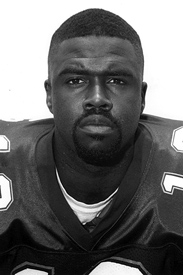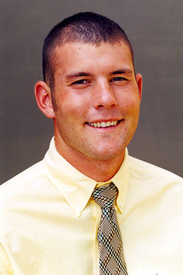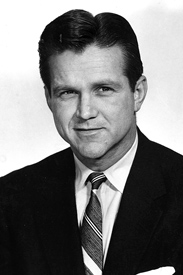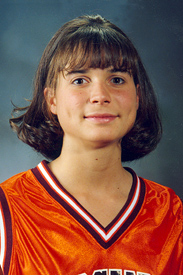BLACKSBURG, Va. — A former head coach and former student-athletes from five different sports make up the latest class selected for the Virginia Tech Sports Hall of Fame.
The six 2009 inductees are:
- The late Gene Crane, a distance runner of the late 1970s who still ranks as the top steeplechaser in Virginia Tech track & field history.
- Maurice DeShazo, a mobile quarterback whose productivity on the field helped the Hokies to back-to-back bowl games for the first time in school history.
- Aaron Marchetti, an All-America tennis player who earned the highest rankings of any Tech tennis player during the late 1990s.
- The late Chuck Noe, a fiery, innovative coach who instilled a winning tradition into Tech’s men’s basketball program during seven successful seasons at the helm from 1955-62.
- Brian Sharp, who still stands as the only Tech golfer to be named both all-conference and first-team all-state four consecutive seasons.
- Lisa Witherspoon Hansen, whose tough, unselfish play at point guard helped spark the Tech women’s basketball program to new heights in the late 1990s.
The six new honorees will be inducted at a Hall of Fame dinner on the Tech campus on Friday, Nov. 20, the evening before Tech's home football game against NC State. Each of the living inductees and families of all of the inductees will be introduced to fans at halftime of the football game.
The new inductees will bring the total number enshrined to 147. The Virginia Tech Sports Hall of Fame was established in 1982 and is currently located near the Bowman Room on the fourth floor of the Jamerson Athletic Center. Hall of Fame plaques engraved with portraits of all the members are displayed there. Under Tech Hall of Fame guidelines, persons are not eligible for induction until they have been out of school for a period of 10 years.

Virginia Tech’s cross country and track & field programs didn’t enjoy a conference affiliation or much in the way of training facilities when Gene Crane entered school in 1974. But that didn’t seem to dim the young distance runner’s dream of one day running in the nationals.
Crane made the team and joined the travel squads early on. He showed steady improvement thanks in large part to his unwavering dedication and determination. With encouragement from volunteer assistant coach Todd Scully, Crane took up the steeplechase as his primary event during the outdoor season. The 3,000-meter race is one of the most demanding events in track, incorporating four barriers (hurdles) and a water jump that forced the competitors to clear a total of 28 ordinary barriers and seven water jumps during the course of the race.
In 1976, Crane finished sixth in the steeplechase at the State Outdoor Championships. The following year, he placed sixth in the event once again, this time helping the Hokies win the State Outdoor title and end William & Mary’s 14-year reign as meet champs. Crane set a school record in the steeplechase that still stands when he ran a time of 8:47.2 on the way to a third-place finish in the 1978 State Championships. He also set a school mark in the 5,000 meters that day, while finishing fourth in that event. Crane’s time in the steeplechase qualified him for the NCAA Championships, fulfilling his dream.
In May 1978, Tech joined the Metro Conference, and the following spring Crane took second place in the steeplechase at the 1979 Metro Outdoor Track & Field Championships. He also finished second in the event at both the Atlantic Coast Relays and the State Championships that season.
While specializing in the steeplechase during the outdoor season, Crane continued to make contributions to the cross country and indoor track squads throughout his Tech career. He helped the indoor team win the state title in 1978 with a sixth-place finish in the 3-mile run, ending another long William & Mary run (11-straight years).
Crane graduated from Tech as an honor student in health and physical education in June 1979 and went home to Richmond, Va., to begin training for a new goal, the Olympic trials. Tragically, he was struck and killed by a car later that month after completing a workout.

Maurice DeShazo was considered the most highly touted quarterback ever to sign with Virginia Tech when he joined the football program in 1990. By the time he closed out his career with the Hokies, the Stuart, Va., native had lived up to his billing by becoming one of the most productive signal-callers in school history.
Following a stellar prep career at Bassett (Va.) High School, DeShazo spent one season at Tech as a redshirt and another as a backup before taking over the offensive reigns in 1992. In the season opener that year against James Madison, he became the first Tech quarterback in over 40 years to account for three touchdowns in his first start. He went on to pass for 1,504 yards during the season and became just the second Tech quarterback ever to throw 12 touchdown passes in his first season as a starter.
His last two seasons at Tech, DeShazo became the first quarterback to guide the Hokies to back-to-back bowl games. He also passed for over 2,000 yards in both seasons, becoming just the second Hokie at the time (there are three now) to accomplish that feat in consecutive seasons.
In 1993, DeShazo threw a school-record 22 touchdown passes and ranked fifth nationally in passing efficiency with a rating of 157.53. He tossed four touchdown passes in games against both Maryland and Temple. He was also named the offensive MVP in the ’93 Independence Bowl after passing for 192 yards and a pair of TDs in the Hokies’ 45-20 win over Indiana.
DeShazo passed for 2,110 yards and 13 touchdowns and ran for four additional TDs during his senior season. He finished as the Hokies’ all-time leader in total offense (6,105) and touchdown passes (47) and was third at the time in career passing yards (5,720). He also set career marks for games with multiple TD passes (18) and yards per completion average (14.4 with minimum 200 completions), both of which he still holds. DeShazo’s career records for total offense and touchdown passes stood until Bryan Randall surpassed both marks in 2004.
DeShazo currently resides in Suffolk, Va., where he is an independent car dealer.

Aaron Marchetti was heavily recruited nationally after posting a 127-7 career singles record at Williamstown High School in West Virginia, and it didn’t take him long to make an impact once he reached Blacksburg.
As a freshman in 1995-96, Marchetti led the Hokies with 33 wins to only nine losses. He was ranked as high as No. 66 in the nation and was voted the Most Outstanding Rookie Performer in the Atlantic 10 Conference, as well as the NCAA Region I Rookie of the Year.
Playing primarily at the No. 2 position as a sophomore, Marchetti was ranked among the nation’s top 100 players most of the year on the way to a 30-7 mark. He was named the Atlantic 10 Player of the Year and won Tech’s Bernstine Award for showing the most teamwork.
Marchetti ranked as high as No. 14 in 1997-98, advancing to the NCAA Championships in singles and doubles and compiling a 39-7 record at the No. 1 spot. His final ranking in singles was 21st. He repeated as the A-10 Player of the Year and was the recipient of the Oliver Mayo Award for being the team’s most outstanding player.
In 1999, he became just the second All-American in Tech men’s tennis history, qualifying for the NCAAs in singles and doubles for the second consecutive year. He finished ranked No. 15 in singles, giving him the two highest finishes in school history. Marchetti also earned A-10 Player of the Year honors for the third consecutive season and was named all-conference for the fourth-straight year.
Marchetti teamed with his brother, Adam, in doubles his final two seasons. They ranked No. 33 nationally as a team in 1998 and finished 35th in 1999.
Currently, Marchetti lives in Overland Park, Kan., where he is the co-director of Overland Park Racquet Club Academy, teaching college-bound juniors to play tennis.

When Chuck Noe was named the head men’s basketball coach at Virginia Tech in 1955, the Hokies had posted just five winning seasons since the early 1920s. As it turned out, Noe was just the man to change Tech’s round ball fortunes.
In his seven years at the helm of the Tech men’s basketball program, Noe guided the Hokies to seven consecutive winning seasons, compiling 109 victories. In 1959-60, Tech posted the first 20-win season in school history with a 20-6 record that included a 12-1 mark in Southern Conference play. The Hokies won the league’s regular season title that season and also laid claim to the state championship with a 7-0 mark against in-state competition.
Many felt the 1961-62 edition of the Hokies was the masterpiece of Noe’s stay in Blacksburg. Prior to the season, the team was given an outside chance for a break-even season, but Noe guided the sophomore-laden Hokies to an outstanding 19-6 record and their fourth state title in six seasons. The team won 18 of its last 21 games and put together a 10-game winning streak that matched the longest streak by a Tech team during the previous 40 years.
Noe succeeded with his organization, teaching techniques and fiery spirit. He was called a drillmaster with multiple offensive patterns and a maestro with ingeniously devised defenses. In early 1961, he used the “mongoose” offense, which was later called the four corner offense. He was also one of the first coaches to teach a zone-trap defense.
The Louisville, Ky., native was named the Southern Conference Coach of the Year after guiding his first Tech team to a 14-11 overall record and a third-place finish in the conference. The Hokies were 7-20 a year earlier. Noe was also named the league’s top coach after the 1961-62 campaign, his last season at Tech. His teams finished among the top three teams in the conference all seven seasons he coached. The 1961-62 season marked Tech’s fourth straight undefeated campaign at home, running the Hokies’ home winning streak to 36 games and Noe’s record in Blacksburg to 54-5 (.915).
Noe’s 109-51 overall record at Tech still ranks him second all-time in victories. His teams posted a 75-26 record (.743) in Southern Conference play and went 46-12 (.793) against in-state competition. Six players who Noe recruited are currently members of the Virginia Tech Sports Hall of Fame.
After leaving Blacksburg in 1962, Noe went on to coach at South Carolina and VCU before embarking on a successful broadcasting career. He died in December 2003 at the age of 79.

Brian Sharp began his college days at the University of Tennessee, but his collegiate golf career didn’t tee off until he transferred to Virginia Tech in the fall of 1991. That fall, Sharp came on strong in the Hokies’ last two fall tournaments and finished second on the squad in fall scoring average. The following spring, he led Tech in all but one tournament as a redshirt freshman.
During his four-year Tech career, Sharp set a record for most rounds played, and started in the No.1 position in every tournament during that time. He won four collegiate events, including the 1995 Metro Conference Golf championship as a senior. His four-year stroke average of 74.14 was the best for a Tech golfer since 1979 at the time and still ranks as the sixth best over the past 30 years.
Sharp was voted the Hokies’ MVP all four years he competed and was a three-time winner of the team’s Most Dedicated Player Award. He became the only Tech golfer to be both a four-time all-conference pick and a four-time first-team all-state honoree. He was one of only three golfers in the history of the Metro Conference to be a four-time all-conference pick. Sharp was also named the Metro student-athlete of the year and won the Medallion Award for the most outstanding male student-athlete at Virginia Tech in 1995. He was selected to the NCAA All-District 3-North team twice.
Sharp turned professional in 1995 after graduating with a degree in finance. He played on various developmental tours before joining the Buy.com Tour. He returned to Tech as assistant golf coach in the fall of 2003. He earned an MBA from Tech’s Pamplin College of Business in 2006 and was promoted to associate head coach in July 2008. Following Tech’s 2009 season, Sharp was named the recipient of the Jan Strickland Award Presented by TaylorMade-Adidas to the Assistant Coach of the Year, as selected by the Golf Coaches Association of America.

Lisa Witherspoon was the spark plug for Tech women’s basketball teams in the late 1990s. A natural point guard from Newton, N.C., she became one of the most popular players in school history, while handing out assists in record-setting fashion.
It was Witherspoon’s intensity, effort and toughness that caught people’s attention.
She made an impact while playing in all 28 games as a backup during her freshman season. She then persevered through a year of injury and illness as a sophomore in 1996-97. In a game against Iona that season, Witherspoon managed nine assists despite suffering a broken nose. Following the win, she needed six pounds of fluid to battle dehydration. She went on to finish the season with 124 assists, 50 steals and a 5.6 point per game scoring average.
As a junior, Witherspoon battled through a stress fracture in her foot to start 30 games and become the first player in the program’s history to distribute 200 assists in a season. Her total surpassed the old season mark by 55. The 5-foot-6 playmaker also led the team in steals with 62 as the Hokies won the Atlantic-10 Conference championship and advanced to the NCAA Tournament.
Witherspoon and her senior classmates were dubbed the “Working Class” prior to the 1998-99 season due to their extraordinary chemistry and emphasis on teamwork. With Witherspoon dishing out a school-record 246 assists and adding a school-best 86 steals, Tech posted its best season ever, registering a 28-3 record and advancing to the Sweet 16 in the NCAA Tournament. Following the season, she was named honorable mention All-America by The Associated Press.
A Tech graduate in exercise science and physical education, Witherspoon’s senior numbers in assists and steals still stand as school season records, as does her career total of 635 assists. She ranks third in career steals (219) and is still the only Tech women’s basketball player to record over 200 assists in a season.
Lisa Witherspoon Hansen, who holds a Ph.D in Education from the University of South Florida, currently lives in Tampa, Fla. She is an assistant professor in the Department of Physical Education and Exercise Science at USF and is co-director of two research labs.
Enshrined earlier in the Tech Hall of Fame were: Carroll Dale, Chris Smith, Bob Schweickert, Allan Bristow, Leo Burke, Tim Collins, Don Strock, John Wetzel, Dickie Beard, Glen Combs, Tom Beasley, Brandon Glover, Mike Widger, George Foussekis, Stuart Johnson, Leland Melear, Jerry Gaines, Ken Whitley, Bill Grossman, Jack Burrows, Mac Banks, Lewis Mills, Franklin Stubbs, Keith Neff, Howard Pardue, Lucy Hawk Banks, Roy Beskin, Jack Prater, Dale Solomon, Ginny Lessmann Stonick, Neff McClary, Mike Johnson, Linda King Steel, Tony Paige, Bruce Smith, Dell Curry, Connie Sellers, Dick Arnold, Frank Beamer, Renee Dennis, Cyrus Lawrence, Rick Razzano, Jim Stewart, Sterling Wingo, Robert Brown, Don Divers, Loyd King, Kenny Lewis, Ken Barefoot, Bob Phillips, Steve Taylor, Ted Ware, Mike Burnop, Bimbo Coles, Ken Edwards, Ki Luczak, Lori McKee Taylor, Amy Byrne Feathers, George Canale, Don Oakes, Ricky Scales, Sherman VanDevender, Gene Breen, Mickey Fitzgerald, Bob Grossmann, Chuck Hartman, Judy Williams, Ron Davidson, Anne Jones Thompson, Wayne Robinson, Dennis Scott, Lisa Pikalek Karlisch, Jim Pyne, Mike Williams, Bob Wingfield, Billy Hardee, Robin Lee, Mark Stickley, Terry Strock, Armand Taylor, Ray Crittenden, Antonio Freeman, Marcus Kramer, Charles Moir, Christi Osborne Vest, Cornell Brown, Ace Custis, Oliver Mayo, Trey McCoy, Jenny Root Price, Jim Beard, Eugene Chung, Eric McClellan, Kathleen Ollendick, Dr. James I Robertson, Jr.; and the following persons who are deceased: C.P. (Sally) Miles, Frank Moseley, Frank Loria, Hunter Carpenter, Frank Peake, Herbert McEver, Greene (Red) Laird, Paul Dear, Monk Younger, Henry (Puss) Redd, Mel Henry, George Parrish, Hank Crisp, Ed Motley, Sonny Utz, Wilson Bell, Herb Thomas, Bob Ayersman, Bill Buchanan, Dick Esleeck, Al Casey, Joe Moran, William Grinus, Jr., Earl (Bus) Hall, H.V. (Byrd) Hooper, James Franklin Powell, Bucky Keller, Milton Andes, Richard Bullock, Waddey Harvey, Frank Teske, George Smith, Eddie Ferrell, Jerry Claiborne, Dick Redding, Johnny Oates, Bobby Smith, George Preas, Louis Ripley, Wendy Weisend, Madison Nutter, Berkeley Cundiff, Bill Matthews, Margaret Soulen Gilbert, Harry Bushkar and Howie Wright.
For updates on Virginia Tech men's tennis, follow the Hokies on Twitter (@VT_MTennis).
 Ticket Market Place
Ticket Market Place
 Sports Radio Network |
Sports Radio Network |  Travel Center & Info
Travel Center & Info


